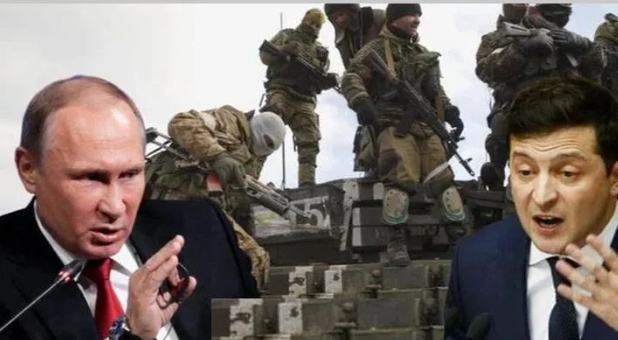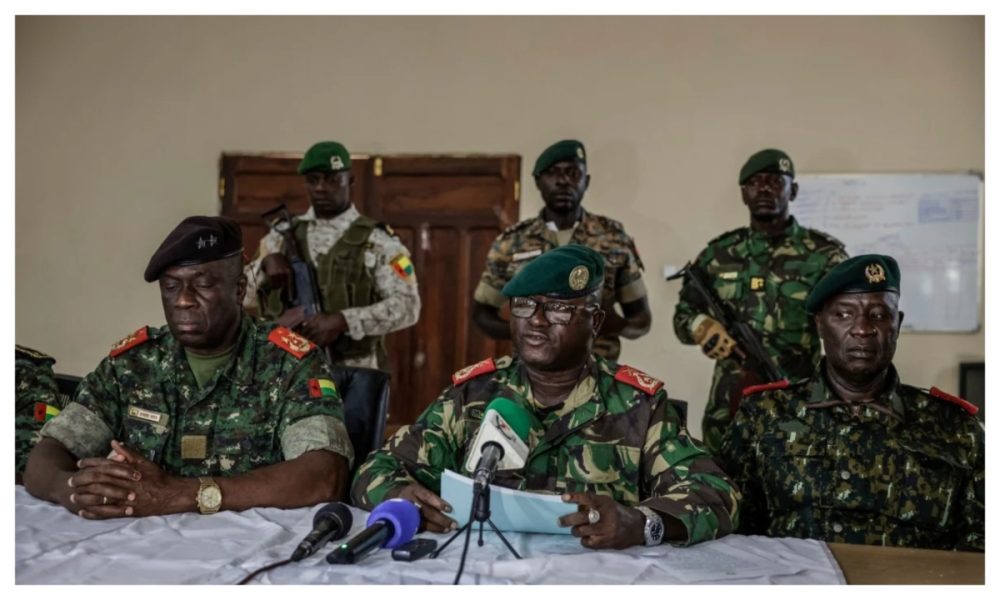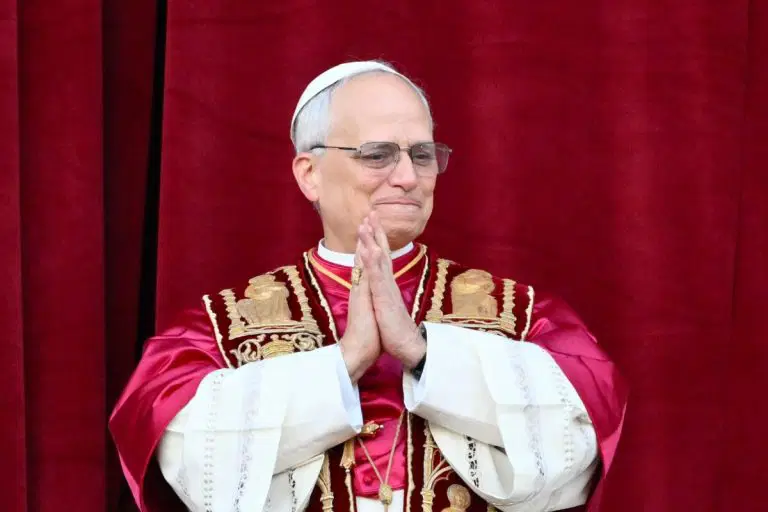Headline
Ukraine War Dominates Crucial NATO Summit

NATO leaders were set Wednesday to invite Finland and Sweden to join after Turkey dropped objections, as the alliance looked to revamp its defences at a summit dominated by the war in Ukraine.
More than four months after Russia invaded Ukraine, upending the European security landscape, leaders gather in Madrid for what NATO chief Jens Stoltenberg called a “historic and transformative summit” for the alliance’s future.
Ukrainian President Volodymyr Zelensky is set to address the meeting via video link to renew Kyiv’s pleas for accelerated weapons deliveries from its allies.
NATO countries, which have already committed billions of dollars in military assistance to Kyiv, will agree to a “comprehensive assistance package to Ukraine, to help them uphold the right for self-defence”.
READ ALSO:EU, NATO Forming Coalition To Fight Russia – Minister
“We meet in the midst of the most serious security crisis we have faced since the Second World War,” Stoltenberg said.”
“We’ll state clearly that Russia poses a direct threat to our security.”
NATO is due to launch the largest revamp of its defence and deterrence capabilities since the end of the Cold War by strengthening the forces on its eastern flank and massively ramping up the number of troops it has at high readiness.
“Russia now is an aggressor in Ukraine, Russia attacked Ukraine and Russia is a threat for Europe but not only for Europe, for all NATO,” Poland President Andrzej Duda said.
“This is a very clear situation now.”
– Turkey drops opposition –
Beyond Ukraine, the summit will see a revamp of NATO’s strategic concept — which outlines its main security tasks, but has not been revised since 2010 — to mention challenges posed by China for the first time.
Finland and Sweden will be invited to join the alliance at the summit after Turkish President Recep Tayyip Erdogan on Tuesday lifted his opposition following crunch talks with the leaders of the two Nordic countries in Madrid.
The move is a blow to Russia’s President Vladimir Putin, who launched his war in Ukraine saying he wanted to stop NATO expansion but is now set to see his border with the alliance more than double.
READ ALSO: US Says NATO Commitment To Lithuania ‘Ironclad’ After Russia Threat
Erdogan had stubbornly refused to back the applications from the Nordic pair — lodged in response to Russia’s war on Ukraine — despite pressure for a change of course from his NATO allies.
But Erdogan’s office said it had agreed to support them as Ankara had “got what it wanted”.
Ankara had accused Finland, and especially Sweden, of offering a safe haven to Kurdish militants who have been waging decades-long insurgency against the Turkish state.
“As we begin this historic NATO summit in Madrid, our alliance is stronger, more united and more resolute than ever,” he said in a statement.
But it will still take months for Finland and Sweden to officially join NATO, as their entry needs to be ratified by the parliaments of the 30 member states.
– ‘Stop Russian terror’ –
The summit comes as war rages across Ukraine, particularly in the eastern Donbas region where Moscow has been focusing its offensive after failing to capture Kyiv in the conflict’s early days.
There was global outrage Monday after a missile strike on a shopping mall in the central city of Kremenchuk killed at least 18 people and injured dozens.
Russia claims its missile salvo was aimed at an arms depot. But AFP talked to civilians in Kremenchuk, and none of them knew of any weapons store in the neighbourhood.
“Everything burned, really everything, like a spark to a touchpaper. I heard people screaming. It was horror,” witness Polina Puchintseva said.
All that was left of the mall was charred debris, chunks of blackened walls and lettering from a smashed storefront.
“Only total insane terrorists, who should have no place on Earth, can strike missiles at civilian objects,” said Zelensky on his social media channels.
“Russia must be recognised as a state sponsor of terrorism. The world can and therefore must stop Russian terror,” he added.
Addressing the UN Security Council Tuesday, Zelensky called for the United Nations to visit the site so they can independently assess whether the destruction was caused by a Russian missile strike.
READ ALSO: War: We’re At Critical Juncture – NATO
At their summit in Germany, G7 leaders agreed to impose new sanctions targeting Moscow’s defence industry, raising tariffs and banning gold imports from the country.
But the Kremlin was unfazed, insisting that Ukrainian forces had to surrender to end the fighting.
“The Ukrainian side can stop everything before the end of today,” Kremlin spokesman Dmitry Peskov said.
“An order for the nationalist units to lay down their arms is necessary,” he said, adding Kyiv had to fulfil a list of Moscow’s demands.
Headline
Coup: Guinea-Bissau Junta Releases Six Held Opposition Politicians

Guinea-Bissau’s ruling junta on Tuesday released six members of the political opposition who had been detained since a coup last month.
The six freed opposition members are said to be close associates of Domingos Simoes Pereira, head of the PAIGC party that led the country to independence in 1974.
Pereira has been in custody since the coup.
In a statement by the High Military Command, the junta’s governing body, the releases are described as a sign of good faith and a step towards the return to constitutional normality and respect for international rights.
READ ALSO:Why West African Troops Overturned Benin’s Coup But Watched Others Pass
The army seized power on 26 November after ousting outgoing President Umaro Sissoco Embalo in the wake of a presidential vote.
After taking over, the military suspended the electoral process and announced it would take control of the West African country for a period of one year.
Recall that another opposition candidate, Fernando Dias, took refuge in Nigeria’s embassy, which granted him asylum, while Embalo fled the country after being briefly detained by the military at the time of the coup.
Meanwhile, Senegal’s Foreign Minister, Cheikh Niang, led a delegation to Guinea-Bissau, where he met with detained opponents and requested their release.
Headline
7 Territories Still Under Colonial Rule

Even though most nations became independent in the last century, some territories are still ruled by other nations.
Contents
1. Western Sahara
2. Guam
3. American Samoa
4. United States Virgin Islands
5. Falkland Islands / Malvinas
6. Gibraltar
7. Bermuda
Many of them remain on the United Nations list of non-self-governing territories, meaning they have not completed the process of decolonization. These places usually depend on bigger countries for laws, passports, defence, or political control.
In this article, Nigerian Tribune highlights 7 territories still under colonial rule:
READ ALSO:Nigeria Ranks World’s 102nd Happiest Nation, US, Germany Not Among 20 Top Counties
1. Western Sahara
Western Sahara remains one of the world’s biggest unresolved colonial issues. Morocco controls most of the territory, but the Polisario Front wants independence for the Sahrawi people. The UN is still trying to help both sides agree on a peaceful solution.
2. Guam
Guam is an important US territory in the Pacific, used heavily for American military operations. The US oversees its defence and foreign relations.
People living there are US citizens, but they cannot vote in presidential elections and do not have full representation in Congress.
READ ALSO:FULL LIST: US To Review Green Cards From 19 ‘Countries Of Concern’ After Washington Shooting
3. American Samoa
American Samoa has more local control than Guam, but the United States still decides immigration, defence, and foreign affairs.
Residents are considered US nationals and must apply if they want full citizenship.
4. United States Virgin Islands
The US Virgin Islands have their own legislature, but the United States makes major constitutional and political decisions. The territory depends heavily on US federal support.
5. Falkland Islands / Malvinas
The Falkland Islands remain controlled by the United Kingdom (UK), but Argentina has long disputed this claim, having been in control of the Islands for a few years before 1833.
The people living there voted strongly to stay British, yet the sovereignty dispute continues to appear in the UN.
READ ALSO:Six Countries With Highest Number Of Billionaires In 2025
6. Gibraltar
Gibraltar sits at the Southern tip of Spain. The United Kingdom controls it, but Spain insists the territory belongs to them.
Gibraltarians have repeatedly voted in favour of remaining British, but the dispute is still discussed within the UN Decolonisation Committee.
7. Bermuda
Bermuda is a British Overseas Territory situated in the North Atlantic Ocean. Although it manages most of its own internal affairs and enjoys a strong economy with modern facilities, the United Kingdom still handles its defence and represents it in global matters.
Headline
Russia-Ukraine War: Pope Leo Calls For Global Christmas Truce

Pope Leo XIV on Tuesday renewed his call for a global truce on Christmas Day, saying he felt “great sadness” after Russia “apparently rejected a request” for a pause in fighting.
Speaking to reporters at his residence in Castel Gandolfo near Rome, the Pope urged all sides involved in conflict to observe at least one day of peace.
“I am renewing my request to all people of goodwill to respect a day of peace — at least on the feast of the birth of our Saviour,” Leo said.
Recall that Russia invaded Ukraine in February 2022 and has repeatedly turned down calls for a ceasefire, arguing that any pause would give Ukraine a military advantage.
READ ALSO:Russian Strikes Kill Five In Ukraine, Cause Power Outages
“Among the things that cause me great sadness is the fact that Russia has apparently rejected a request for a truce,” the pope said.
Referring to conflicts worldwide, Leo added, “I hope they will listen and there will be 24 hours of peace in the whole world.”
The appeal came as fighting continued in eastern Ukraine. On Tuesday, Ukrainian forces withdrew from a town after heavy battles with Russian troops. Russian strikes killed three civilians and left thousands without power during winter temperatures.
READ ALSO:Trump Blasts Ukraine For ‘Zero Gratitude’ Amid Talks To Halt War
There was no indication of progress toward ending the war after separate meetings last weekend in Miami between the United States officials and negotiators from Russia and Ukraine. The conflict is nearing four years with no settlement in sight.
Earlier this month, Pope Leo met Ukrainian President Volodymyr Zelensky. When asked whether he would accept Zelensky’s invitation to visit Ukraine, the pope said, “I hope so,” while noting that it was not possible to say when such a visit could happen.
Leo also warned that efforts to secure peace without European diplomatic involvement were “unrealistic”, expressing optimism that President Donald Trump’s proposed peace plan could bring a “huge change” to the transatlantic alliance.

 News3 days ago
News3 days agoPHOTOS: New Era In Furupagha-Ebijaw As Okpururu 1 Receives Staff Of Office

 News2 days ago
News2 days agoUBTH CMD Marks 120 Days In Office, Expresses Commitment To Providing Conducive Working Environment

 News3 days ago
News3 days agoFG Declares Public Holidays For Christmas, New Year Celebrations

 News3 days ago
News3 days agoOPINION: Gumi And His Terrorists

 News2 days ago
News2 days agoFIRS Confirms NIN As Tax ID

 News2 days ago
News2 days agoOPINION: My Man Of The Season

 Metro2 days ago
Metro2 days agoFintiri Pardons Man Sentenced To Death For ‘Killing Herdsman In Self-defence’, Others

 News3 days ago
News3 days agoOPINION: Christmas And A Motherless Child

 News2 days ago
News2 days agoKWAM 1 Withdraws From Awujale Race, Ends Court Challenge

 Metro2 days ago
Metro2 days agoPetrol Tanker Crashes Into Akpabio’s Convoy, Kills Police Dispatch Rider




























